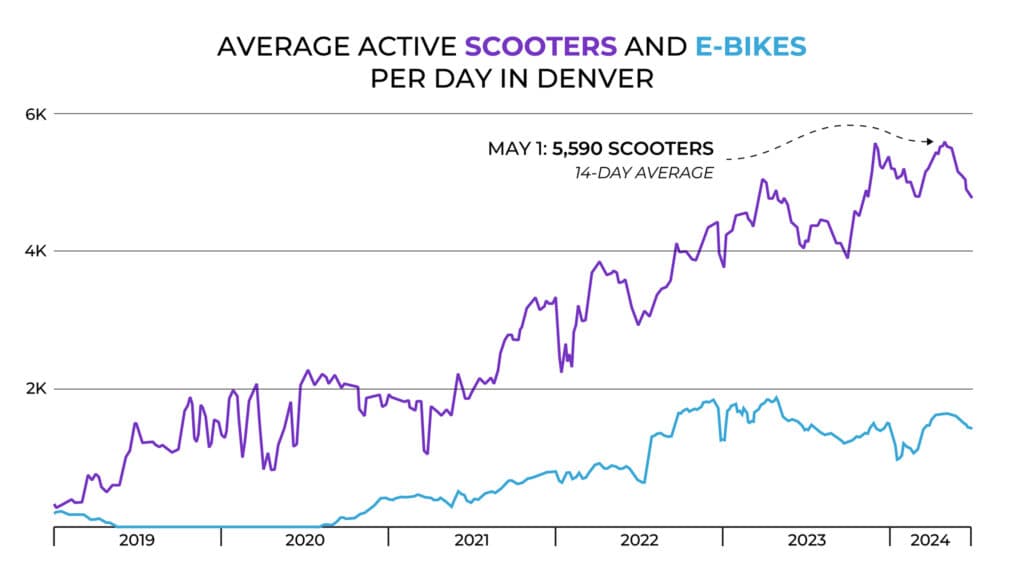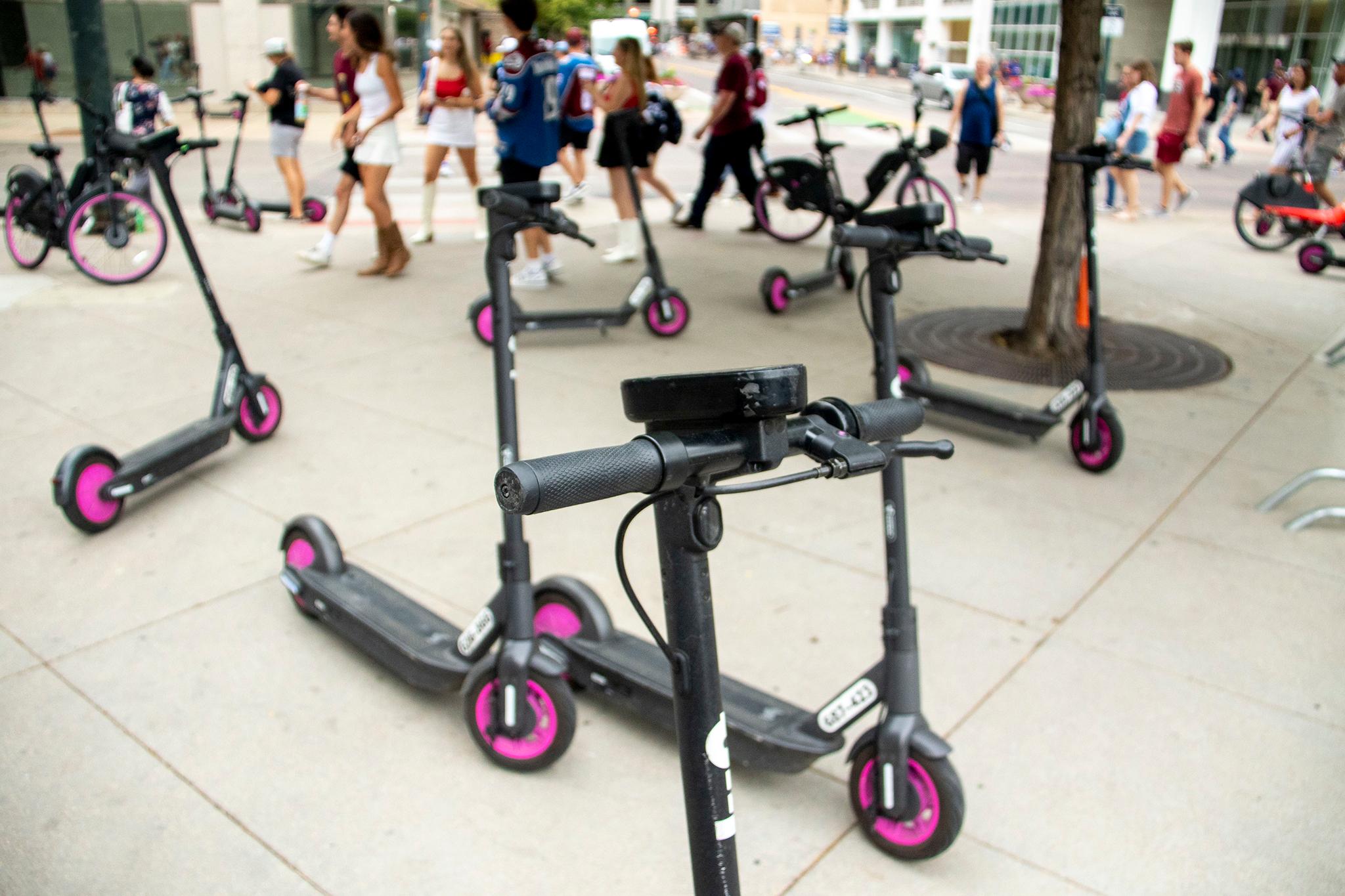People in Denver have taken about 20 million rides on shared electric scooters and bikes since the city’s “micro-mobility” fleet first appeared in 2018.
Love them or hate them, the scooters get a lot of traffic.
But now, one of the two companies contracted by the city to operate in Denver might be scaling back operations.
Lyft announced last week that the company is ending its dockless bike and scooter program, which includes the types of scooters and bikes the company operates in Denver.
“Dockless” scooters and bikes can generally be picked up and dropped off anywhere; in contrast, docked scooters and bikes must begin and end trips at charging stations.
Lyft operates about 3,000 scooters and nearly 600 e-bikes in Denver, making up nearly half of the city’s total fleet — at least for now.
“We are narrowing our product portfolio to focus on our best-in-class bikes and ebikes, scooters, electrified docking stations, and software, to better sell to, serve, and electrify cities,” wrote Lyft CEO David Risher in a statement last week. “This means we will no longer operate standalone dockless bikes and scooters. We are discontinuing our dockless scooters in Washington, D.C., and are exploring alternatives for our dockless bikes and scooters in Denver.”
Denver and Washington, D.C., are the only cities where Lyft operates dockless scooters or bikes. The company may want to move away from the dockless model because it can be more difficult and costly to manage compared to the docked model, according to Smart Cities Dive.
What happens next?
It’s unclear whether Lyft will switch to docked scooters and bikes in Denver, withdraw from the city altogether, or adapt in some other way.
It’s also unclear why exactly the company is ending dockless scooters, though it’s clear Lyft is going through some major changes as it tries to become profitable. The company also announced last week that it will be laying off 1 percent of staff.
Lyft did not respond to Denverite’s request for comment on how it will change its Denver scooter and bike operations.
Nancy Kuhn, spokesperson for Denver’s Department of Transportation and Infrastructure, said the city does not yet know Lyft’s exact next steps. But she said micro-mobility is here to stay, regardless.
“Given the popularity of micro-mobility in the Mile High City and our interest in alternative transportation, we'd like to ensure that scooters and e-bikes remain a viable travel option for our residents and visitors,” Kuhn said in an email to Denverite. “We have not yet had a discussion on next steps with Lyft and will work to minimize impacts to users as we chart a path forward.”
Denver’s other scooter company said it plans to continue operations.
Lyft's main local competitor, Lime, said demand continues to grow.
Denverites took 3.5 million trips on Lime scooters in the first eight months of 2024, a 53 percent increase compared to 2023, said Zach Williams, Senior Director of Government Relations. Like Lyft, Lime uses the dockless model for its scooters.
"Lime is fully committed to Denver and the millions of people who have taken a ride on our e-scooters and e-bikes here,” Williams said. “We are in the midst of another record year for ridership in Denver and across the Front Range, and we're proud of our work with the City and our local partners to make Denver a model for successful micro-mobility nationwide."
Citywide data for both companies shows that usage peaked this summer, with the scooter fleet collectively traveling an average of 30,000 miles per day — compared to numbers closer to 20,000 the previous summer.

It’s not clear how Lyft’s dockless business has been doing in Denver. A 2024 report from Lyft found that ridership in the company’s fare discount program for low-income people grew by 11 percent in Denver between 2022 and 2023. Ridership for the company’s e-bikes grew nationwide, but the report did not provide overall ridership growth numbers in the city.
While scooters and bikes have been popular, they’ve also been a pain point for the city.
Scooters come with injury risks. Riders — who often do not wear helmets — face the threat of cars on the streets, but they also can pose a hazard to pedestrians and cyclists moving at slower speeds on city trails and sidewalks.
The number of people admitted to Denver Health for electric scooter crashes rose from 18 people in 2018 to 158 people in 2022.
Despite rider rules and city and company safety efforts, riding on sidewalks remains a problem. And with the dockless model, riders often leave scooters and bikes strewn across sidewalks and driveways, creating an accessibility issue for pedestrians and especially people with disabilities.
City Councilmember Chris Hinds, who uses a wheelchair, began discussions last month about potential legislation to enforce rules against scooters blocking the right of way, and to push for more designated parking areas.
“I've heard some people call me the micro-mobility killer, and I would say that's not me,” he said. “I'm not trying to kill micro-mobility, but what I am trying to do is make sure that we have a broad and inviting pedestrian experience, whether it's not [having] scooter litter on our streets or on our sidewalks, and that scooter riders are following the law.”
That legislation is just in the early stages. But changes to Lyft’s model, or the potential withdrawal of the company’s scooters altogether, could change what future ridership and policy looks like in Denver.
Editor's note: This article has been updated to correct the name and title of Lime's spokesperson.












